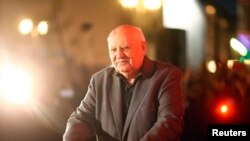Mikhail Gorbachev, the man who played a major role in ending the Cold War was praised for being a "rare leader" who helped change the course of world history.
Gorbachev, the last Soviet president, forged arms reduction deals with the United States and partnerships with Western powers to remove the Iron Curtain that had divided Europe since World War Two and bring about the reunification of Germany.
U.S. President Joe Biden hailed a "rare leader... one with the imagination to see that a different future was possible and the courage to risk his entire career to achieve it."
"The result was a safer world and greater freedom for millions of people," Biden said.
Jailed Kremlin critic Alexei Navalny on Wednesday praised Gorbachev - who died Tuesday at age 91 - for "peacefully" departing from power.
"He stepped down peacefully and voluntarily, respecting the will of his constituents. This alone is a great feat by the standards of the former USSR," Navalny said on Twitter.
Russian winner of last year's Nobel Peace Prize, Dmitry Muratov, hailed his fellow Nobel laureate as someone who "put human rights above the state, and valued a peaceful sky more than personal power."
"He despised war," he said. "He gave both the country and the world an incredible gift -- he gave us thirty years of peace. Without the threat of global and nuclear war."
After decades of Cold War tension and confrontation, Gorbachev brought the Soviet Union closer to the West than at any point since World War Two.
"He gave freedom to hundreds of millions of people in Russia and around it, and also half of Europe," said former Russian liberal opposition leader Grigory Yavlinsky. "Few leaders in history have had such a decisive influence on their time."
But Gorbachev saw his legacy wrecked late in life, as the invasion of Ukraine brought Western sanctions crashing down on Moscow, and politicians in both Russia and the West began to speak of a new Cold War.
President Vladimir Putin said Gorbachev "was a politician and statesman who had a huge impact on the course of world history," expressing "deepest condolences" to his friends and family.
"He led our country during a period of complex, dramatic changes," Putin added.
"He deeply understood that reforms were necessary, he strove to offer his own solutions to urgent problems."
But Gorbachev's internal reforms helped weaken the Soviet Union to the point where it fell apart, a moment that President Vladimir Putin has called the "greatest geopolitical catastrophe" of the twentieth century.
"A one-of-a-kind statesman who changed the course of history" and "did more than any other individual to bring about the peaceful end of the Cold War", UN chief Antonio Guterres said in a statement.
European Commission President Ursula von der Leyen hailed a "trusted and respected leader" who "opened the way for a free Europe".
His "crucial role" in bringing down the Iron Curtain and ending the Cold War left a legacy "we will not forget."
Gorbachev will be buried in Moscow's Novodevichy Cemetery next to his wife Raisa, who died in 1999, said Tass, citing the foundation that the ex-Soviet leader set up once he left office.
"We are all orphans now. But not everyone realizes it," said Alexei Venediktov, head of a liberal media radio outlet that closed down after coming under pressure over its coverage of the Ukraine war.
